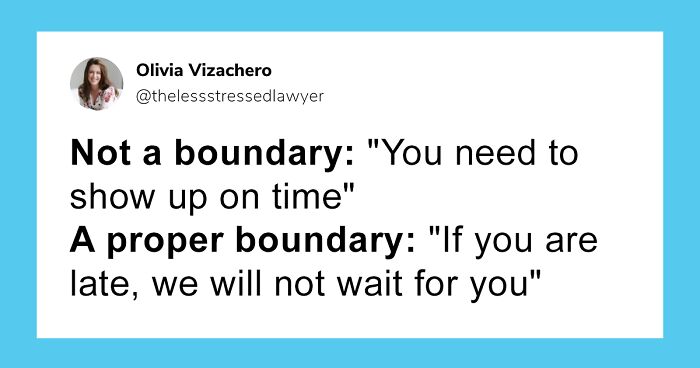
Personal Coach Explains How To Set Boundaries Properly In An Illuminating Thread
Interview With AuthorWe have all been in a situation where we felt like we were losing control of things and letting ourselves be dragged by others. This is where boundaries become crucial.
Not only do healthy boundaries in relationships create mutual respect between people, they are also a form of self-care. They honor your needs and wishes by letting others know what is and what is not okay for you. This applies to both your personal and professional lives, so knowing how to and what is the right time to set your boundary is extremely valuable.
However, not many people know how to do it properly. Olivia Vizachero, a lawyer and personal life coach who helps people live lives with less stress and far more fulfillment, shared an illuminating thread on her Instagram where she explained how a proper boundary differs from what most people think of as a boundary, which is not.
“You’re bad at setting boundaries because you never learned. That changes now,” Vizachero wrote in a caption. So I invite you to have your notes ready and pull your seats closer!
More info: Linktr.ee
Life coach Olivia Vizachero explained how to set proper boundaries in this illuminating thread
Image credits: thelessstressedlawyer
Bored Panda reached out to Olivia Vizachero, a former lawyer who practiced commercial litigation in Big Law and criminal defense at a boutique trial firm in Detroit. Now, Vizachero works as a certified life coach and founder of The Less Stressed Lawyer where she helps attorneys who are over the overwhelm live lives with less stress and far more fulfillment by teaching them how to manage their mindset and make themselves and their well-being their top priority.
“I specialize in helping people overcome people-pleasing, procrastination, and perfectionism, so they’re able to thrive in their professional and personal lives,” Vizachero said. She is also the host of The Less Stressed Lawyer Podcast and a co-author of the book #Networked, a pandemic anthology written by 20 women lawyers about networking and building successful businesses during a global public health crisis.
We asked Vizachero how she defines a proper boundary, and the life coach said that it’s a “decision you make about what behavior you will and won’t tolerate coupled with the particular course of action you will take if a boundary violation occurs. A proper boundary is structured as an ‘if you [fill in the blank], I will [fill in the blank]’ statement.”
Moreover, a proper boundary is always about the action that you will take, Vizachero argues. “It isn’t about controlling the other person’s behavior. A proper boundary always takes into account the truth that other people have free will and get to do whatever they want. Most people aren’t taught to think this way which is why they struggle with setting boundaries.”
Vizachero claims that “instead of accepting that other people have the free will to behave however they choose, people spend time arguing with other people’s behavior, which gets them nowhere.”
Vizachero explained that she loves helping people live lives on their terms. “Instead of trying to control other people and constantly self-sacrificing to make other people happy, I teach my clients to create the lives they want to live. I teach them how to care less about what other people think, how to do what they want to do instead, and how to set goals and follow through with achieving them,” the life coach explained.
“As a result of working with me, people finally get to live the lives they’ve been dreaming of. It is the most rewarding career imaginable,” Vizachero added.
Image credits: thelessstressedlawyer
You can’t help but notice the paradox in setting boundaries, which comes down to the fact that people tend to say that they value and prioritize them, yet only a few know how to actually set them. Vizachero believes that most people struggle to set boundaries for two reasons.
“First, they don’t understand the proper boundary format, so they set improper boundaries and simply attempt to control other people’s behavior. That leads to disaster every time,” she explained. And second, “they bring the wrong mindset with them when it comes time to set boundaries. They think things like ‘She can’t/shouldn’t say that’ or ‘He can’t/shouldn’t do that.’ Or they think that people ‘must’ do something a specific way.”
Vizachero explained that “that mindset runs contrary to the truth that people have the power to do whatever they want. When you accept that people have free will and can behave however they choose, you empower yourself to choose if their actions align with your preferences and if they do not, you get to choose how you want to respond.”
If you are afraid to set boundaries, Vizachero wants you to know that is normal, especially in the beginning. “Feeling uncomfortable isn’t a good enough reason not to set them. Just allow yourself to feel guilty and worried and put your boundaries in place regardless. As I always say, #GAGandGO through your discomfort. The life you want to be living is waiting for you on the other side,” the life coach concluded.
Vizachero’s advice on setting boundaries properly resonated with many people online
However, others disagreed with the author’s approach to boundary setting
Explore more of these tags
Also wow. I'm surprised at the number of people here who don't think boundary-setting is okay! I absolutely use some of the boundaries mentioned in this post at work. They discourage burnout and compassion fatigue, and allow me to continue enjoying my job and not feel taken advantage of. Great post!
I agree. It’s important to be clear in your own head where your boundaries lie. Dispassionate explanations about behavior you will not engage with. No judgment on the other person, just a clear statement about what you will not tolerate. I use it often in my work and I often get along better with others because of it.
Load More Replies...I feel like I have ZERO right to tell people how to behave. Even if that behavior negatively affects me. Conversely, I can email you whenever the f**k I feel like it. You don’t get to tell me what I can and cannot do. Boundaries are indeed self-protection and self-care. I don’t like emails on weekends (some prefer it) so I shut down all notifications regarding my email and I don’t check it. That’s how I establish my boundary. I don’t announce it and I don’t think OP is implying you should. She’s speaking of actions you take, not words. You will know I don’t reply until Monday when I simply don’t reply until Monday. My boundaries are an agreement I have with myself, not anyone else. Ergo, I don’t explain them ever. People who push up on them will find out via action. Only when confronted with boundaries do folks occasionally ask why something did or didn’t happen. With the email example, I would have simply replied “it was the weekend; my time off.” No need to explain any further.
Of course you have a right to tell peo-ple how to behave. If someone starts shouting right in your face you have to respond to that, and inform them it's unacceptable behaviour. An extreme example perhaps, but other human interactions also have a positive or detrimental effect on you, so you have to define your relationship. Not to do so leads to frustration because you act one way in oner situation, and another way in a similar situation, which they don't understand because you have not communicated where the red line lies. Communication of your red lines and boundaries is important. And accepting others is too.
Load More Replies...Also wow. I'm surprised at the number of people here who don't think boundary-setting is okay! I absolutely use some of the boundaries mentioned in this post at work. They discourage burnout and compassion fatigue, and allow me to continue enjoying my job and not feel taken advantage of. Great post!
I agree. It’s important to be clear in your own head where your boundaries lie. Dispassionate explanations about behavior you will not engage with. No judgment on the other person, just a clear statement about what you will not tolerate. I use it often in my work and I often get along better with others because of it.
Load More Replies...I feel like I have ZERO right to tell people how to behave. Even if that behavior negatively affects me. Conversely, I can email you whenever the f**k I feel like it. You don’t get to tell me what I can and cannot do. Boundaries are indeed self-protection and self-care. I don’t like emails on weekends (some prefer it) so I shut down all notifications regarding my email and I don’t check it. That’s how I establish my boundary. I don’t announce it and I don’t think OP is implying you should. She’s speaking of actions you take, not words. You will know I don’t reply until Monday when I simply don’t reply until Monday. My boundaries are an agreement I have with myself, not anyone else. Ergo, I don’t explain them ever. People who push up on them will find out via action. Only when confronted with boundaries do folks occasionally ask why something did or didn’t happen. With the email example, I would have simply replied “it was the weekend; my time off.” No need to explain any further.
Of course you have a right to tell peo-ple how to behave. If someone starts shouting right in your face you have to respond to that, and inform them it's unacceptable behaviour. An extreme example perhaps, but other human interactions also have a positive or detrimental effect on you, so you have to define your relationship. Not to do so leads to frustration because you act one way in oner situation, and another way in a similar situation, which they don't understand because you have not communicated where the red line lies. Communication of your red lines and boundaries is important. And accepting others is too.
Load More Replies...
 Dark Mode
Dark Mode 

 No fees, cancel anytime
No fees, cancel anytime 







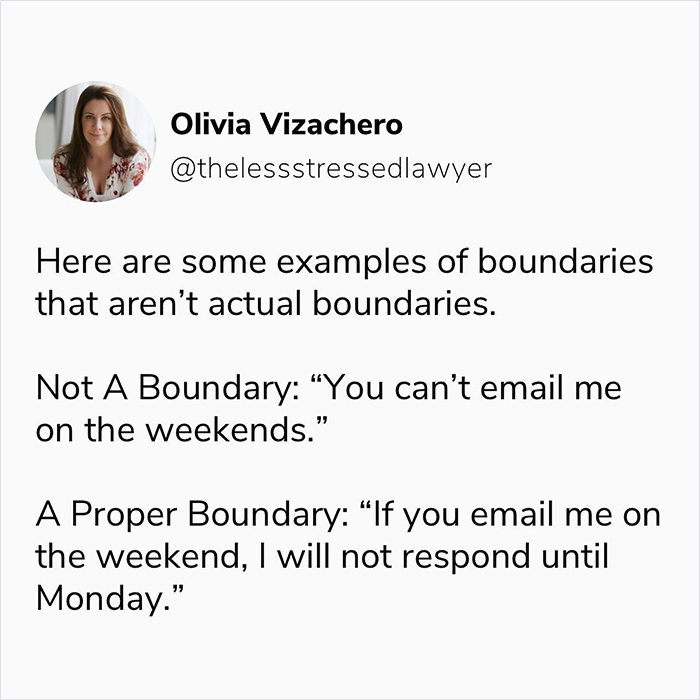
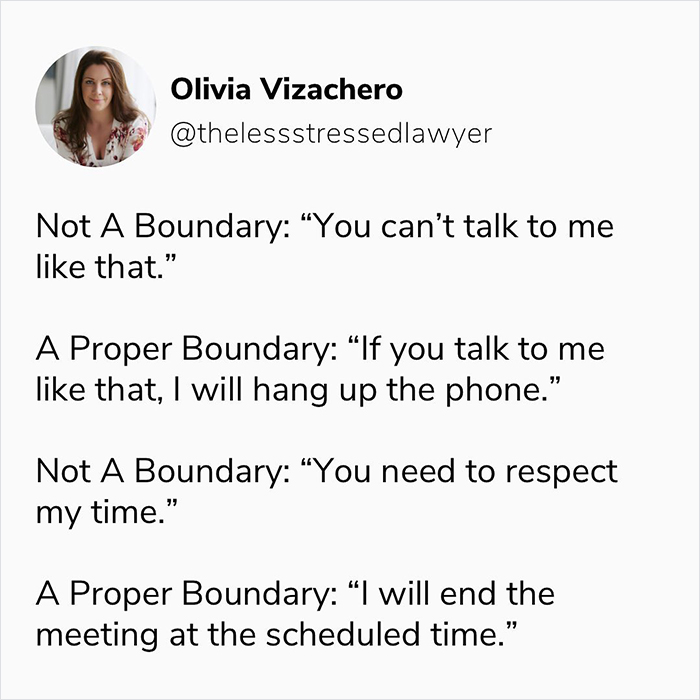
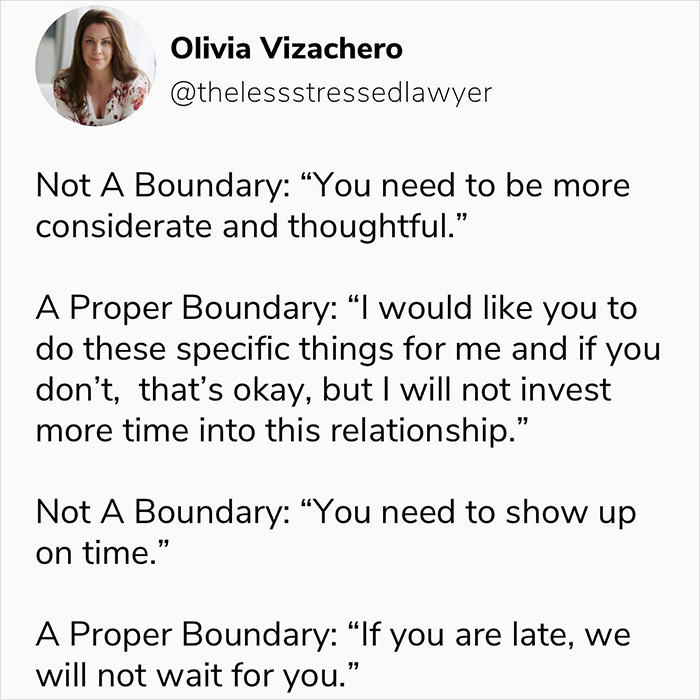
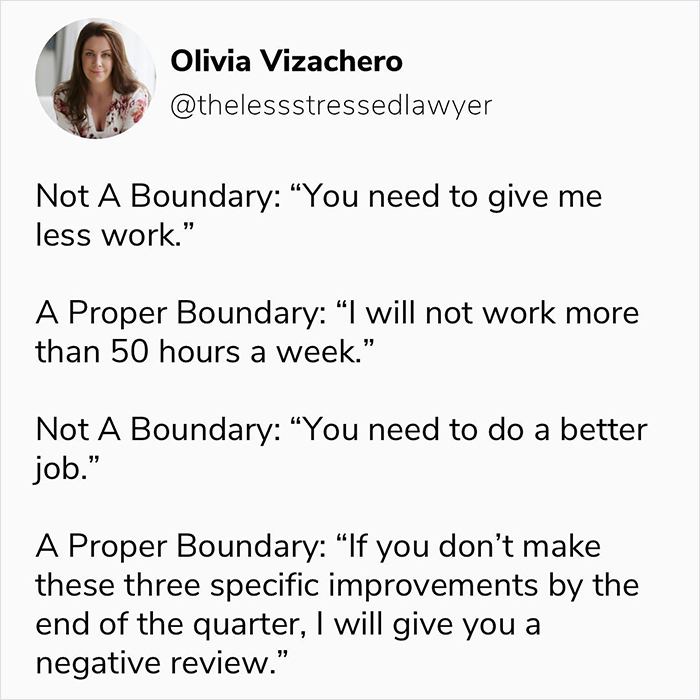
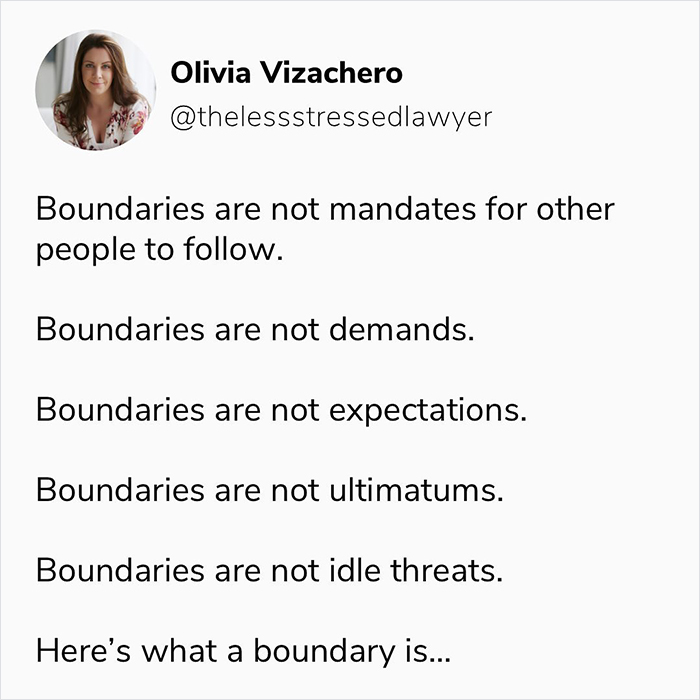
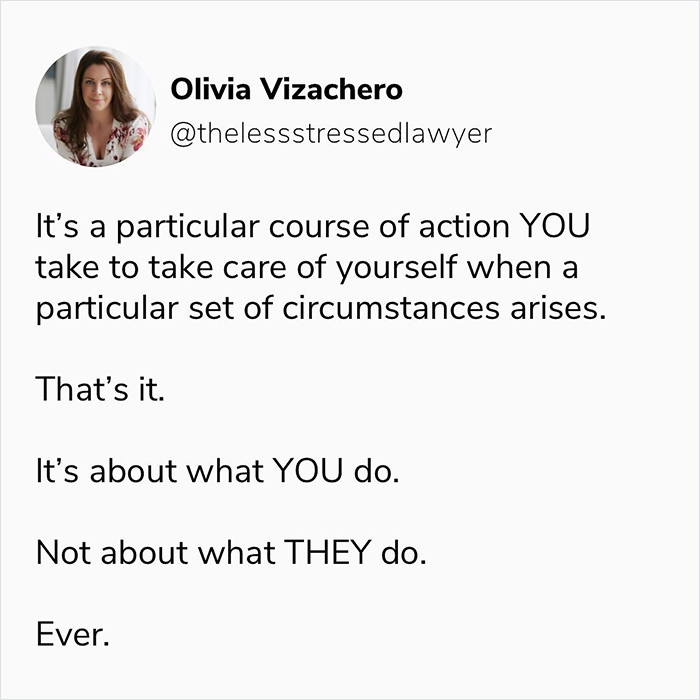



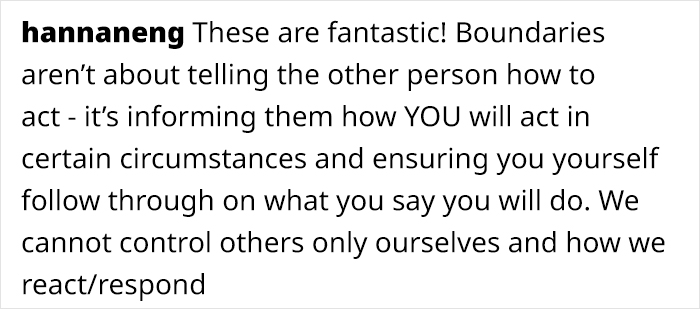



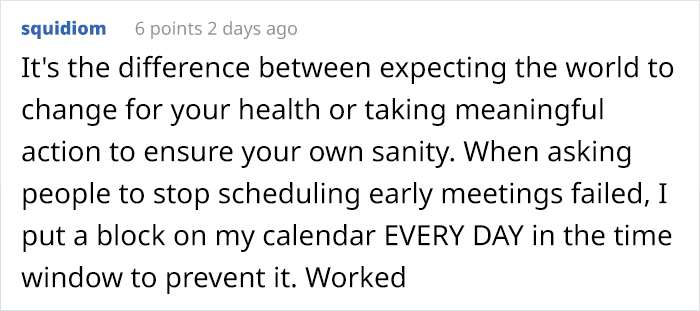


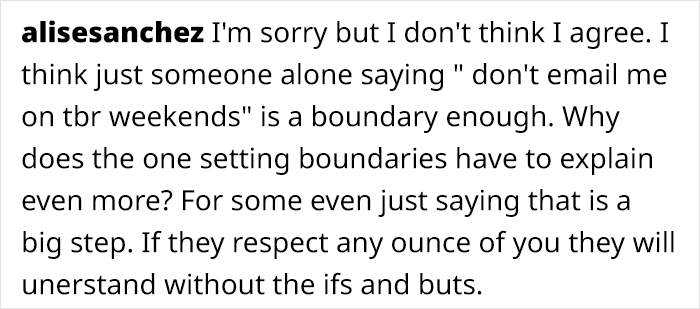


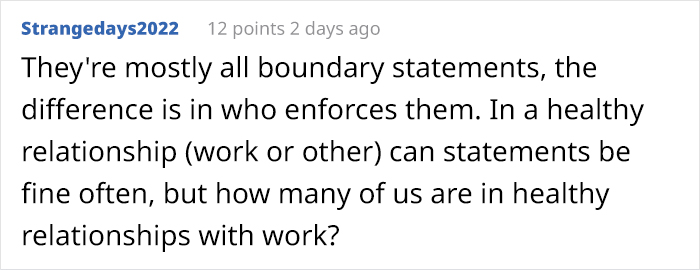
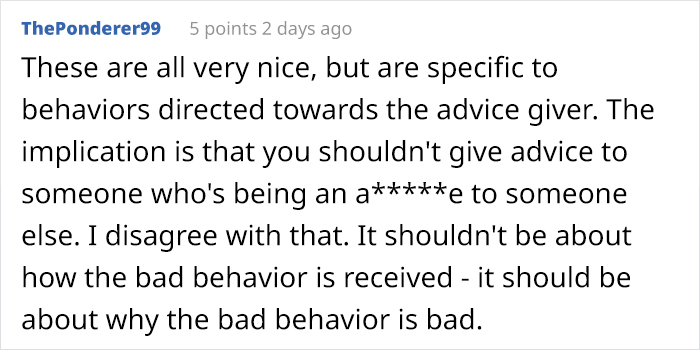

















































112
29